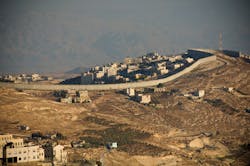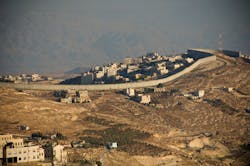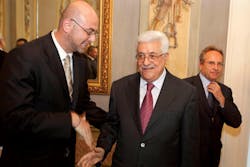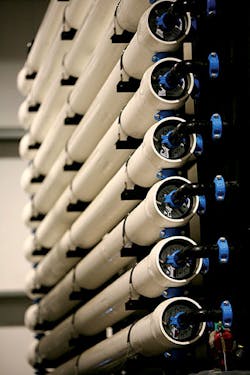By 2020 the population of Gaza will increase to around 2.1 million. Putting heavy strain on an already unusable coastal aquifer, a reverse osmosis desalination plant has been touted as the only answer. With several funders and international institutions already involved, will this ever-growing complicated project get off of the ground? Jeremy Josephs reports.
Palestine is expected to have a 60% increase on water demand by 2020. With a tiring coastal aquifer yielding only 55 million m3/year, the current population is already consuming three times the amount of water being generated. As a result, further population growth will make this water source 'irreversibly damaged' by 2020.
According to a World Bank report issued in 2009, the situation is so dire that "only 5 – 10% of the aquifer is now yielding drinking quality water". With no alternative existing source of fresh water, a large-scale desalination plant has long been considered an absolute requirement to address the water deficit and has been widely heralded as the major long-term solution for water supply.
Desalination – the answer?
Such a long-term solution will come at a cost: $455 million to be precise. The Islamic Development Bank has signalled support for half of this. And once the French government had announced its 10 million euro investment at the World Water Forum held in Marseille in March 2012, the project seemed set to proceed apace.
The proposed 55 million m3/year membrane-based, reverse osmosis (RO) technology facility appeared to have such momentum behind it that it was reported that even Israel was standing by and ready to offer its experience and expertise on desalination to Palestine to help the project on its way. Energy and water minister Uzi Landau stated publicly that Israel was fully on board. But that was before operation Pillar of Defence, the seven-day Israel Defense Forces (IDF) operation in the Hamas-governed Strip.
One unfortunate but perhaps inevitable consequence of which was that the momentum for the construction of the proposed 80,000 square meter facility within the governorate of Dar El Balah appears to have taken something of a battering too. Of course political issues always go hand in hand with key decisions relating to water, but nowhere is this close inter-relationship thrown into sharper relief than in the troubled Middle East. Here, issues of good neighbourliness are the exception rather than the rule.
There might well be dozens of agencies and institutions queuing up to say how they approve and endorse the notion of a desalination facility for the Gaza Strip. Yet not everyone agrees that the proposed plant is going to be quite the panacea it is cracked up to be.
Funding and partnerships
Nor is it just France or the Islamic Development Bank involved in this project. Purely down to the sheer number of stakeholders involved, things start getting complicated.
"This includes direct investments from the European Investment Bank, the European Commission, the Islamic Development Bank representing a consortium of Arab Gulf states, the French Government via AFD, its national development agency, and the World Bank also having a role to play," says Fuad Bateh, senior advisor for Environment and Water at Barcelona-based Union for the Mediterranean's (UfM)
The UFM is working for the Palestinian National Authority as the developer/promoter.
"This is now a mega-project in a very difficult place – so we believe that the participation of all of these players is both desirable and necessary. It's also worth noting that included in that group is the United Nations Environmental Program in general and UNICEF in particular via its WASH (Water Sanitation and Hygiene) Cluster Initiative."
So when it comes to co-ordinating and liaising with so many diverse organisations, is this more of a bureaucratic nightmare?
"Well, if you have ever worked in Gaza you will know that you have to really engage all actors. And there are some actors with specific skill sets," explains Bateh.
"For example when it comes to local knowledge of the water sector – the World Bank and UNICEF – they are both incredibly valuable. In respect of it being a desalination facility it's been very positive that the UN Environmental Programme has publically stated that desalination in Gaza is the only reasonable option because, as you will know, desalination is sometimes at the receiving end of a bad press on environmental grounds."
The consortium is now said to be developing a roll-out plan which reflects earlier work carried out by the Palestinian Authority on a series of interventions to provide water for Gaza. "Of course no one is going to go forward without the funding commitments in place."
Total investment now means that 200 to 213 million dollars are now figured into the proverbial pot, according to the senior adviser. The European Commission has already issued four million Euros for a technical assistance package that is to be managed by the European Investment Bank. A proportion of those funds will go towards the tendering of the project. The project already has a pre-existing feasibility study, although that dates back to 2003 when the project was first deemed feasible.
When asked directly if the project is going ahead, Bateh responds: "The answer is yes. Yes, it is going forward, via technical assistance from the European Commission. The tendering process is now complete. The contract is due to be awarded during the next four to five months. Consultants will then have a one year period to update all of the technical work. Meanwhile, here at the UfM we are planning for a pledging conference by the end of this year based on this updated technical information. At that point, we are then looking for implementation to begin in 2014."
Responsibility of water control
Guillem Canneva, a researcher in service management at AgroParisTech, one of France's leading water science engineering schools, has expressed a number of reservations which, for the moment at least, appear not to have been fully addressed.
"Broadly I would support the project," he says. "But it would appear to me to raise several key issues nevertheless. It seems as if we might well be substituting one sort of dependency for another. Gaza might come to be better off in terms of water supply, true enough, but worse off in terms of its dependency on outside energy. Has this been fully thought through?
"This in turn raises the question of the cost of this energy and how, precisely, it is going to be paid for. Desalination will also mean that drinking water production will take place on one particular site which will of course then become extremely strategic in nature. Whoever controls the plant will naturally wield huge power. Who is going to ensure that the power is not abused? And how will that be carried out?"
Canneva also raises concerns over having just one site for water production. "Concentrating the production of drinking water into one particular site will also, in my view, really increase its vulnerability in the event of an attack on what will clearly be an absolutely critical infrastructure," he says.
"And in any event, strengthening the production of drinking water supply will not necessarily improve if networks are in poor shape. As things stand it seems to me as if a substantial part of the water produced at great expense will in reality be lost. The problem is clearly hugely complex and there is no one simple solution."
Unfortunately the Palestinian Water Authority was unavailable for comment. However, Amal Hudhud works for the Nablus municipality in Palestine where she coordinates public awareness campaigns for all environmental aspects including water conservation, wastewater and industrial wastewater and solid waste. She also works as a freelance regional consultant and, as such, knows the issues facing Gaza well.
Her view in respect of the project is that it is of vital importance to focus on issues such as operation costs, brine disposal and the availability of qualified personnel to operate what will clearly be a high tech system. Above all, she questions whether or not desalination is a sustainable solution for Gaza in the first instance.
Water – the olive branch for Israel-Palestine?
Václav Havel, the dissident playwright turned president and who led the struggle to bring down communism in Czechoslovakia passed away less than two years ago. He was one of the principal authors of the human rights manifesto Charter 77, and remained an important voice in global affairs until his death. He also happened to know about global water issues and of their key role in the Middle East.
"I believe that progress in the peace process and in finding solutions for water issues between Israel and Palestine would also help to unblock progress in the broader region, between the parties on the Jordan, the Orontes, the Tigris, and the Euphrates rivers", he wrote back in 2008. "Water can be a catalyst for regional cooperation, opening the way to a future comprehensive 'Community of Water and Energy' to enhance the human environment. In such a forum, water and solar energy in tandem could help to move the Middle East from conflict to collaboration.
"The cost of inaction or merely pretending to act is likely to be high for everyone in the Middle East. Future water policy should no longer be seen as an extension of current policy, but rather as a new opportunity. Water is the essence of life. People in Palestine and in Israel need it; people in the region need it. Cooperating to secure it is the only way forward."
Back in Barcelona the UfM's Bateh says that he couldn't agree more with Havel's words.
"I know I might have got rather bogged down in describing to you the various steps involved in getting this Gaza desalination project off of the ground. You can see for yourself that it's extremely slow and frustrating," he says. "But if we take a step back from the mechanics of funding, feasibility studies and the like – we should remember at all times that 2013 is the UN Year of International Cooperation on Water. The Gaza project is 100% emblematic of that and should become, in my view, not just a flagship project for the Mediterranean region, but the entire world."
- Jeremy Josephs is a freelance contributor for WWi magazine. For more information on this article, please contact: [email protected]







